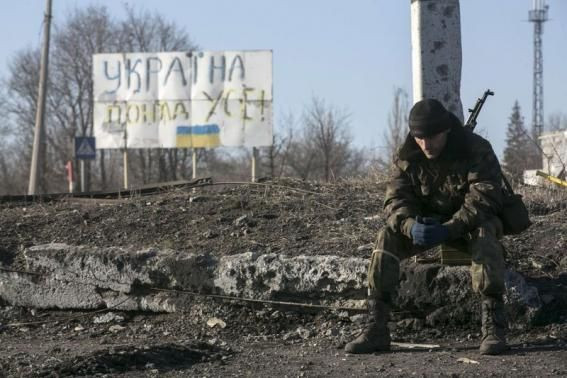Rebels Order Weapons Pull-Back As Ukraine Says Armor Arriving

(Reuters) - Pro-Moscow rebels said they would start to withdraw heavy weapons from the front line in eastern Ukraine on Sunday but the government in Kiev said armored columns had crossed the border from Russia to reinforce the separatists.
The Ukrainian military said the rebels were pressing on with attacks on government forces near Mariupol, a port in government hands that is seen as the rebels' next major target.
Spokesman Andriy Lysenko said a military train carrying 60 armored vehicles including tanks had arrived in the town of Amvrosiivka from Russia on Saturday. A convoy of military equipment had later crossed the border near Novoazovsk, east of Mariupol on the Sea of Azov.
He said fighting was in progress at the village of Shyrokyne, east of Mariupol.
"The fight continues. Our soldiers are holding their positions," Lysenko said, adding that there had been a total of 44 attacks by separatists across the conflict zone in the past 24 hours.
In the city of Kharkiv, three people were killed and 10 wounded on Sunday when an explosive device was thrown from a car into a crowd attending a peace rally, a Ukrainian regional prosecutor said.
The blast, which police called a terrorist act, occurred near a metro station as a crowd of participants in the rally passed by.
A pro-Russian rebel commander said the separatists were due to begin pulling back heavy weapons from the frontline in eastern Ukraine on Sunday, a sign that the rebels may be prepared to halt their advance as part of an internationally brokered peace deal.
Fighting has eased in many areas since a ceasefire came into effect a week ago, but the truce was shaken by the rebel capture on Wednesday of the town of Debaltseve, forcing thousands of Ukrainian troops to retreat.
HEAVY WEAPONS
But moves towards pulling back heavy weapons, together with the exchange of dozens of prisoners with Ukrainian government forces on Saturday, could indicate the rebels intend to observe the truce more fully, having achieved a military objective by seizing Debaltseve.
"The plan was signed last night ... Starting from today there are two weeks to withdraw heavy weapons," Interfax news agency quoted rebel commander Eduard Basurin as saying.
Another Russian news agency, TASS, quoted him as saying the pull-back was still being organized and that the actual withdrawal of weapons would take place from Tuesday.
For the Ukrainian side, Lysenko said there was no confirmation yet as to whether the rebels had started pulling back their weapons.
A Reuters witness saw a 20-vehicle convoy of separatist military trucks with anti-aircraft missile systems and howitzers leaving Debaltseve in the direction of Donetsk.
An attack on Mariupol, a city of half a million people and potentially a gateway to Crimea, which Russia annexed last March, would almost certainly kill off the ceasefire.
On Saturday, government forces and rebels exchanged nearly 200 prisoners, one of the first moves to implement the peace deal reached on Feb. 12 in the Belarussian capital Minsk after the French, German, Russian and Ukrainian leaders met in an attempt to end the 10-month-old conflict.
Both sides continue to accuse each other of violating the ceasefire.
The Ukrainian military said rebels had launched 12 attacks on government troop positions overnight, using artillery and mortar fire.
The town of Pesky near Donetsk had seen the most intense fighting, while separatist groups had attempted to storm Ukrainian positions in Shyrokyne, east of the port city of Mariupol on the Sea of Azov, the military said on Facebook.
Kiev accuses the separatists of building up forces and weapons in Ukraine's southeast and has said it is braced for the possibility of a rebel attack on Mariupol.
The rebel press service DAN said Ukrainian troops had been shelling parts of Donetsk, reporting that artillery fire could be heard in the city in the early morning.
(Additional reporting by Natalia Zinets and Alessandra Prentice in Kiev, Alexander Winning in Moscow; Writing by Giles Elgood)
© Copyright Thomson Reuters 2024. All rights reserved.




















